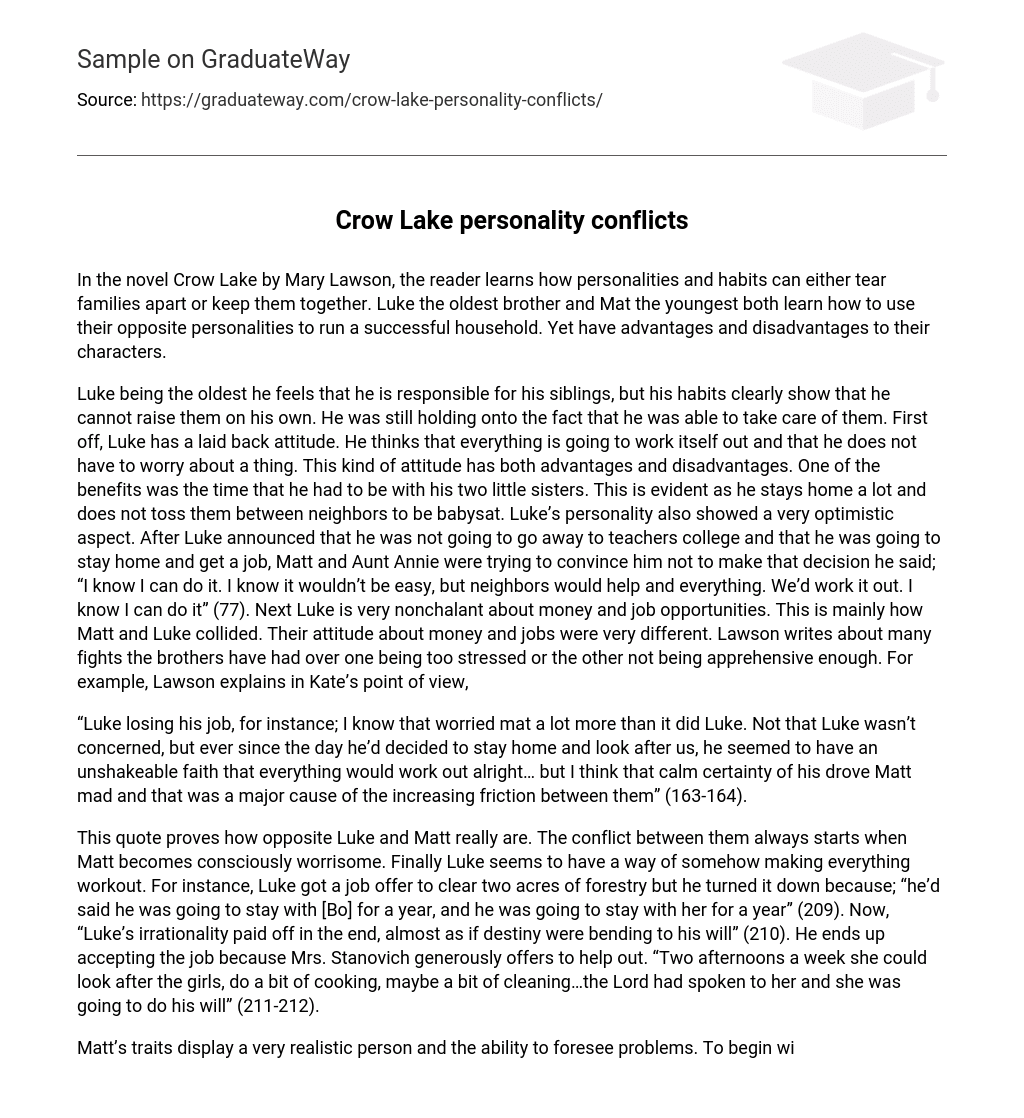In Mary Lawson’s novel, Crow Lake, readers witness the impact of personalities and habits on family dynamics. Luke, the eldest brother, and Mat, the youngest, discover how their contrasting traits can either strengthen or strain their household. Despite their distinct advantages and disadvantages, they learn to utilize these differences for the greater good.
Despite Luke’s inability to properly care for his siblings alone, he feels responsible for them as the oldest sibling. However, he clings to the belief that he can take care of them and maintains a laid-back attitude, assuming that everything will work out without any worries. This attitude has its benefits since it allows him to spend time with his sisters instead of constantly relying on neighbors for babysitting. Nonetheless, it also demonstrates a strong sense of optimism. When faced with opposition from Matt and Aunt Annie regarding his decision not to attend teachers college and instead find a job at home, Luke confidently asserts: “I know I can do it. I know it wouldn’t be easy, but neighbors would help and everything. We’d work it out. I know I can do it” (77). Moreover, Luke’s nonchalant approach towards money and job opportunities creates friction between him and Matt who have contrasting views on these matters. Throughout the book, Lawson showcases multiple fights between the brothers—one overwhelmed by stress while the other remains unconcerned about financial stability—providing insight into this dynamic through Kate’s narration.
Although both Luke and Matt were worried about Luke losing his job, it had a greater impact on Matt. However, Luke maintained his confidence that things would work out because he chose to stay at home and look after them. Nevertheless, Matt’s anger grew due to Luke’s unwavering certainty, which led to increased tension between them (163-164).
This quote demonstrates the stark differences between Luke and Matt. Their conflict typically arises when Matt becomes visibly anxious. However, Luke always manages to find a solution. For example, Luke was offered a job to clear two acres of forestry but declined it because he had promised to stay with Bo for a year. This decision eventually paid off for Luke, almost as if destiny was on his side. Eventually, he accepts the job after Mrs. Stanovich offers to help out. She agrees to take care of the girls and help with cooking and cleaning for two afternoons a week because she believes it is God’s will.
Matt possesses realistic traits and the ability to anticipate problems, which both causes conflicts with Luke and provides help. Without Matt’s problem-solving skills, he wouldn’t have been able to assist in resolving issues. As exemplified by his quote, “We’ve got to do something, Luke.We’re going through Dad’s money so fast,” (175) Matt recognized the urgency of their financial situation.
Additionally, Matt confronted the reality that he couldn’t attend university because it would leave Luke unable to take care of the girls. Consequently, he secured a job at the Hudson Bay Store and established a routine. He emphasized the impossibility of managing without him, asking, “Even if we make it through this year, how are you going to manage when I leave? It’s impossible. One of us has to work and one of us has to stay home; that’s the only way” (178).
Moreover, Matt’s presence was crucial for Kate as she looked up to him as a role model. Kate admired him wholeheartedly and his absence would have been an additional burden amidst the news of their parents’ death. Matt became Kate’s best friend and greatly influenced her future successes.
The time they spent exploring the ponds fostered her interest in biology and she eventually pursued a career in the field. As stated by Kate, “Our visits to the ponds… The interest which Matt had sparked had developed by then into a deeper curiosity…” (218). Overall,Matt plays a significant role in this novel and profoundly impacts each character.
Both Luke and Matt’s differences have a significant effect on their younger sisters, Kate and Bo. One of the consequences is that their fights compromised the innocence of the girls. As the brothers did not possess the skill to solve conflicts in a healthy way, Kate and Bo frequently witnessed frightening disputes. An illustration of one such fight can be found below:
“I remained motionless, holding my breath. The living room erupted in a loud noise and they resumed their argument. Bo…stood there…observing them… I directed my gaze downward and noticed that Bo was trembling so intensely that her hair seemed to quiver. Her mouth was wide open and tears streamed down her face, yet she made no sound. Bo was incredibly brave. I believed nothing could intimidate her.” (179-181).
Later in the novel, Luke and Matt reached a point where they improved their conflict resolution skills. They only made progress when it became clear that they might be separated from their sisters if they didn’t change their behavior. They began working together to control their impulses to retaliate. According to Dr. Christopherson, it was crucial to prevent a recurrence of the previous events in front of Kate and Bo. He mentioned that, although he would dislike doing so, he would have to inform Aunt Annie if there was any indication of a repeat situation (207).
In summary, the Morrison family’s contrasting personalities ultimately led to their harmony. While the novel does not explicitly depict their conscious recognition of their vast and distinctive differences, it is evident that their main goal was to remain in Crow Lake with their sisters. Luke frequently reiterated the belief that “something will turn up,” and indeed, solutions presented themselves time and again. Luke’s relaxed demeanor ultimately proved successful, as did Matt’s skill in perceiving reality. Ultimately, they achieved a well-functioning household.





